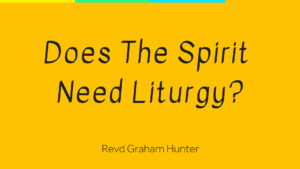Does The Spirit Need Liturgy?
Does The Spirit Need Liturgy?
Revd Graham Hunter spoke at the 2nd Festival of Theology in Nottingham on Wednesday 17th October 2018. The text of his talk is below.
 Intro – Trellis & VineI spent the second half of August this year with my wife and children in a Provencal Mas – a converted farmhouse just a few miles from a little-known French commune named Chateauneuf-du-Pape!As a typical Anglican cleric, I was thrilled by the providential setting of our holiday location, for it enabled me to enjoy the site of mile after mile of vines laid out in expansive Cotes du Rhone vineyards.I managed to sneak an afternoon away from the kids to visit an ancient vineyard and winery and learn a little more about these world-famous vines.One striking feature of the area is the different ways in which the vines are laid out in the fields. Some are planted to grow along long running wire trellis; while others are carefully pruned to form what is known as a goblet vine – as they resemble a classic Paris goblet.
Intro – Trellis & VineI spent the second half of August this year with my wife and children in a Provencal Mas – a converted farmhouse just a few miles from a little-known French commune named Chateauneuf-du-Pape!As a typical Anglican cleric, I was thrilled by the providential setting of our holiday location, for it enabled me to enjoy the site of mile after mile of vines laid out in expansive Cotes du Rhone vineyards.I managed to sneak an afternoon away from the kids to visit an ancient vineyard and winery and learn a little more about these world-famous vines.One striking feature of the area is the different ways in which the vines are laid out in the fields. Some are planted to grow along long running wire trellis; while others are carefully pruned to form what is known as a goblet vine – as they resemble a classic Paris goblet. Why the difference? Some varieties of grapes, it turns out, do better on a smaller vine. They grow best when supported by a simple stake just a foot or so from the ground. They must be carefully pruned and shaped each year – for if they grow too big, they topple over under their own weight. The fruit is usually good on these vines, but there is little of it.(Picture of a goblet vine to the right)
Why the difference? Some varieties of grapes, it turns out, do better on a smaller vine. They grow best when supported by a simple stake just a foot or so from the ground. They must be carefully pruned and shaped each year – for if they grow too big, they topple over under their own weight. The fruit is usually good on these vines, but there is little of it.(Picture of a goblet vine to the right)  On the other hand, vines planted on a running trellis grow longer and reach further. They are able to absorb more nutrients form the soil; they’re more structurally stable, and they yield a much greater crop of fruit.Why do I mention this in relation to my topic? Because good liturgy is the spiritual trellis of the church.‘I am the vine, and you the branches’ says Jesus in John 15. ‘Abide in me and you will bear much fruit’.Good liturgy is the mechanism or means chosen by God to enable us to abide in Jesus and bear much fruit.Disconnected, set apart from one another, we will be like goblet vines – which may only grow to a limited size before toppling under our own weight. Without the running trellis of liturgy which connects the church of Jesus Christ to Jesus Christ, we cannot bear much fruit.Conversely, the running trellis of Christian liturgy is given to connect us to one another across centuries and continents, and enables us to bear spiritual fruit for the world.That’s my central metaphor for understanding God’s purpose in giving liturgy to shape the life of the church – so if you remember only the pictures of goblet vines and running vines, then that’s probably enough.However, if you can bear a little more, then I shall try to share a little more that might be helpful.
On the other hand, vines planted on a running trellis grow longer and reach further. They are able to absorb more nutrients form the soil; they’re more structurally stable, and they yield a much greater crop of fruit.Why do I mention this in relation to my topic? Because good liturgy is the spiritual trellis of the church.‘I am the vine, and you the branches’ says Jesus in John 15. ‘Abide in me and you will bear much fruit’.Good liturgy is the mechanism or means chosen by God to enable us to abide in Jesus and bear much fruit.Disconnected, set apart from one another, we will be like goblet vines – which may only grow to a limited size before toppling under our own weight. Without the running trellis of liturgy which connects the church of Jesus Christ to Jesus Christ, we cannot bear much fruit.Conversely, the running trellis of Christian liturgy is given to connect us to one another across centuries and continents, and enables us to bear spiritual fruit for the world.That’s my central metaphor for understanding God’s purpose in giving liturgy to shape the life of the church – so if you remember only the pictures of goblet vines and running vines, then that’s probably enough.However, if you can bear a little more, then I shall try to share a little more that might be helpful. Gifted Not Needed‘Does the Spirit need liturgy?’ is the title of my talk. Well I might begin by examining the terms of the question? For the Holy Spirit is the 3rd person of the Trinity, participating in the full divinity of the Father and the Son. The Holy Spirit is God, and as such we can impute to him nothing in terms of necessity. If liturgy is the work of the people, then God can do perfectly well without it thank you very much.God does not need our liturgy – but he does give us our liturgy as the means by which he may be known and worshipped. Although liturgy is not listed within the classic lists of the ‘means of grace’, it is a means of grace.The Holy Spirit chooses to give liturgy as precisely that means by which we may be connected to one another, as well as the means by which through such connections we may encounter the divine image reflected within the new covenant community.Liturgy is a gift of God, but it does not constrain divine freedom. Miroslav Volf has claimed that ‘the church is the extension of the incarnation’. He’s wrong – appealing, but wrong. While I appreciate the polemical force of the claim, St Paul uses the body of Christ metaphor as just that – a metaphor.St Paul doesn’t think that when we describe the church as the body of Christ, we’re actually Jesus’ body. The writer to the Hebrews is clear – the dwelling place of the bodily resurrected Jesus Christ is at the right hand of the Father in heaven. (BTW Stranger Things and the ‘upside-down’ starts to hint at how these realms may co-exist.)The point is this, liturgy is not needed by God in any sense in which that might limit divine freedom. But it is gifted to us. Notice please that I’m not making too bold a claim for liturgy – it is not liturgy in and of itself that connects us to Christ. Although good liturgy enables individual Christians and local church communities to participate in the wider life of the people of God, it is a far more profound and gracious gift which enables us to participate in the life of Christ himself.To be ‘in Christ’, to use St Paul’s participative language, is a work of God entirely un-dependent on our liturgical responses. Our liturgy may confess, profess and proclaim the new realities given us by God’s grace – but they neither produce nor constrict those realities.In other words, we don’t need liturgy to produce God’s gracious move towards us in Christ, nor does the Holy Spirit need our liturgies as though there were something lacking in the divine life without them.So if the Holy Spirit does not need liturgy, why does he choose to give liturgy to the church?
Gifted Not Needed‘Does the Spirit need liturgy?’ is the title of my talk. Well I might begin by examining the terms of the question? For the Holy Spirit is the 3rd person of the Trinity, participating in the full divinity of the Father and the Son. The Holy Spirit is God, and as such we can impute to him nothing in terms of necessity. If liturgy is the work of the people, then God can do perfectly well without it thank you very much.God does not need our liturgy – but he does give us our liturgy as the means by which he may be known and worshipped. Although liturgy is not listed within the classic lists of the ‘means of grace’, it is a means of grace.The Holy Spirit chooses to give liturgy as precisely that means by which we may be connected to one another, as well as the means by which through such connections we may encounter the divine image reflected within the new covenant community.Liturgy is a gift of God, but it does not constrain divine freedom. Miroslav Volf has claimed that ‘the church is the extension of the incarnation’. He’s wrong – appealing, but wrong. While I appreciate the polemical force of the claim, St Paul uses the body of Christ metaphor as just that – a metaphor.St Paul doesn’t think that when we describe the church as the body of Christ, we’re actually Jesus’ body. The writer to the Hebrews is clear – the dwelling place of the bodily resurrected Jesus Christ is at the right hand of the Father in heaven. (BTW Stranger Things and the ‘upside-down’ starts to hint at how these realms may co-exist.)The point is this, liturgy is not needed by God in any sense in which that might limit divine freedom. But it is gifted to us. Notice please that I’m not making too bold a claim for liturgy – it is not liturgy in and of itself that connects us to Christ. Although good liturgy enables individual Christians and local church communities to participate in the wider life of the people of God, it is a far more profound and gracious gift which enables us to participate in the life of Christ himself.To be ‘in Christ’, to use St Paul’s participative language, is a work of God entirely un-dependent on our liturgical responses. Our liturgy may confess, profess and proclaim the new realities given us by God’s grace – but they neither produce nor constrict those realities.In other words, we don’t need liturgy to produce God’s gracious move towards us in Christ, nor does the Holy Spirit need our liturgies as though there were something lacking in the divine life without them.So if the Holy Spirit does not need liturgy, why does he choose to give liturgy to the church? Words & Works of LiturgyIn his classic text, Introduction to Christian Worship, James White reminds us that our term liturgy is derived from the Greek term leitourgia – itself a compound word consisting of ‘ergon’ – work, and ‘laos’ – people. Leitourgia / liturgy is a work of the people.3In ancient Greece, liturgy was a public work – given for the benefit of the people. Indeed, paying taxes could be described as a leitourgia – so clearly Google and Amazon are among the low-church anti-liturgists of the corporate world!James White summarises:
Words & Works of LiturgyIn his classic text, Introduction to Christian Worship, James White reminds us that our term liturgy is derived from the Greek term leitourgia – itself a compound word consisting of ‘ergon’ – work, and ‘laos’ – people. Leitourgia / liturgy is a work of the people.3In ancient Greece, liturgy was a public work – given for the benefit of the people. Indeed, paying taxes could be described as a leitourgia – so clearly Google and Amazon are among the low-church anti-liturgists of the corporate world!James White summarises:
‘Liturgy, then, is a work performed by the people for the benefit of others. In other words, it is the quintessence of the priesthood of all believers in which the whole priestly community of Christians shares. To call a service “liturgical” is to indicate that it was conceived so that all worshippers take an active part in offering their worship together.’ (White, 1990, p32)
How then can we understand more fully the spiritual point of these works of the people? And how did we move from the works of the people to the words of the people – words usually presented in a baffling array of bold and italicised text?!The works and the words give both substance and form to our expressions of Christian faith in relation to other Christians. There are some things that basically all Christians in all place and all ages have done. There are some common ‘works of the people’ which span continents and centuries.I may have almost nothing in common culturally with a 6th century Coptic orthodox Christian, or a 21st century Brazilian Pentecostal, or a 16th century German Lutheran, but yet I remain connected to each of them in the body of Christ. Our running trellis somehow connects these disparate parts of the vine.What are the uniting works of Christian peoples? What have most all Christians done in all times and places?Well, this is not an exhaustive list, but
- first, we have gathered together to receive in worship the revelation of God in Christ as witnessed to by Holy Scripture;
- second, we have initiated new members of our community by baptism, as commanded by Jesus;
- third, we have recalled the saving work of God and renewed our response to the new covenant in celebrating Holy Communion;
- fourth, we have prayed for God’s kingdom to come on earth as in heaven and we have interceded for the nations; and
- fifth, we have served the poor, the sick, the lowly and the lonely – seeking to embody the compassionate love of God for all people.
These works of the people are uniting – whether we prostrate ourselves in worship or raise our hands, whether we wear funny clothes or create funny sub-cultures – there are still some basic features of Christian life that we hold in common with others. These ‘works of the people’ or liturgies are a gift of the Spirit to unite us – that we may be one as the Son and the Father are one.But what then of words? How did we end up with so many words? Words have a symbolic function – they stand in for deeper realities. But like all good symbols, there is a trusted connection that bears authority between that which is signified and the signifier. The form of words bears their content and gives them authority to convey meaning. Words have power, and they have power to connect us and draw us into communion with God and one another.But many church traditions are sceptical about the use of liturgical words – the use of fixed words and set texts in our gathered worship. Much of the free evangelical tradition, and indeed with it the charismatic movements, have a lingering suspicion of ordered textual worship.Tom Wright has a brilliant analysis of this - he believes that this suspicion is rooted in the lingering influence of philosophical romanticism and existentialism. Not that people would use these terms of course, but the argument as Tom Wright makes it goes like this: the only thing which is true and authentic is that which comes unfiltered and spontaneously from deep within myself.Romanticism holds central the idea of the autonomous individual who must find ways to express the truthfulness of their 'self'.Existentialism is sceptical about conformity - that is, the idea that your words, thoughts and actions might be conformed to social conventions. To do so renders them inauthentic. Social conformity is a threat to individual expression.You can see how this might be played out in a Christian worship setting - we can find ourselves believing (consciously or sub-consciously) that the most authentic, and therefore spiritually pure, expression of our worship is that which comes from deep within ourselves, without the filters of set form or social conformity getting in the way. The only 'true' prayer or worship in this case is spontaneous prayer and worship. This can lead us to labelling as 'spontaneous' even things that we do routinely.The truth of the matter is that charismatic worship relies very heavily on set texts – but they’re the set texts of the worship song repertoire. The words of our songs as they appear on the projector screens / TVs are our set liturgical texts. They’ve been written by someone else, but we still use them to express our own spiritual devotion. Imagine if we abolished the set texts of our worship songs. Much of our worship would be rendered impossible for any kind of unity in participation. For charismatics, worship song words have a ‘catholicising’ effect: they help us express unity both within our local church, but indeed across a range of churches and denominations.Liturgy is given by the Spirit to have a catholicising effect – the words of our worship songs or our spoken liturgies enable us to be connected across the centuries and the continents. Christians in every time and place can experience what it means to abide in the vine that is Christ through the common life we share in our liturgies. ConclusionSo let me conclude by returning to my original metaphor, though with a brief excursion to an alternative metaphor first.The relationship between the liturgies of our gathered worship and the movement of the Holy Spirit can also be understood by way of a musical metaphor – that of jazz music. I love jazz music. In particular, I love the jazz music of Miles Davis, John Coltrane, and other pioneers of what is sometimes described as the free jazz movement of the 1950s and 60s. This form of music is characterised by amazing improvisation by musicians.As someone who has attempted over the years to play jazz music, I’ve come to realise that true improvisation is only possible when musicians have developed a deep understanding of the musical forms. Only when the deep rules of melody, harmony and rhythm have been learned and practised is it possible to break out of these forms and enjoy the freedom and creativity of improvisation.The best jazz musicians will know their scales, chords and music theory inside out, and can then move freely within and beyond their accustomed musical conventions.Understanding the deep rules and patterns of the liturgies that the Spirit has given to the church can enable us to enter into the joyful improvisation and freedom in worship that comes from the Spirit.And to return to the original metaphor, when we embrace this gift of liturgy, we take our place in that running vine which connects all Christians in all time and all places through both our works and our words – and abiding in that vine, we may bear plentiful spiritual fruit.
Imagine if we abolished the set texts of our worship songs. Much of our worship would be rendered impossible for any kind of unity in participation. For charismatics, worship song words have a ‘catholicising’ effect: they help us express unity both within our local church, but indeed across a range of churches and denominations.Liturgy is given by the Spirit to have a catholicising effect – the words of our worship songs or our spoken liturgies enable us to be connected across the centuries and the continents. Christians in every time and place can experience what it means to abide in the vine that is Christ through the common life we share in our liturgies. ConclusionSo let me conclude by returning to my original metaphor, though with a brief excursion to an alternative metaphor first.The relationship between the liturgies of our gathered worship and the movement of the Holy Spirit can also be understood by way of a musical metaphor – that of jazz music. I love jazz music. In particular, I love the jazz music of Miles Davis, John Coltrane, and other pioneers of what is sometimes described as the free jazz movement of the 1950s and 60s. This form of music is characterised by amazing improvisation by musicians.As someone who has attempted over the years to play jazz music, I’ve come to realise that true improvisation is only possible when musicians have developed a deep understanding of the musical forms. Only when the deep rules of melody, harmony and rhythm have been learned and practised is it possible to break out of these forms and enjoy the freedom and creativity of improvisation.The best jazz musicians will know their scales, chords and music theory inside out, and can then move freely within and beyond their accustomed musical conventions.Understanding the deep rules and patterns of the liturgies that the Spirit has given to the church can enable us to enter into the joyful improvisation and freedom in worship that comes from the Spirit.And to return to the original metaphor, when we embrace this gift of liturgy, we take our place in that running vine which connects all Christians in all time and all places through both our works and our words – and abiding in that vine, we may bear plentiful spiritual fruit.
